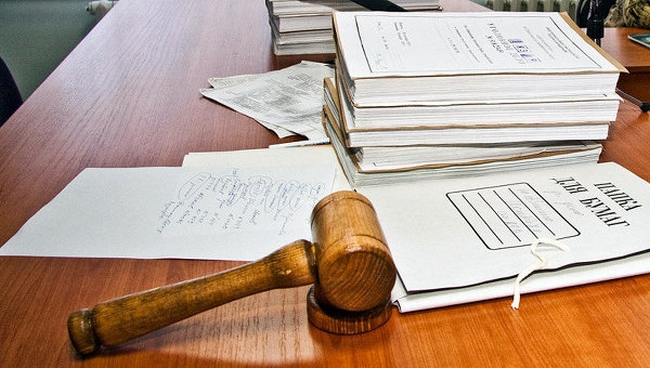
Lawlessness as the Central Pillar of Putin’s Authority
Publication: Eurasia Daily Monitor Volume: 10 Issue: 197
By:

Last week, in a clear signal to its neighbors, Moscow assertively demonstrated two key attributes of Russia’s state power. In particular, on October 30, Russian strategic forces conducted a large-scale exercise with launches of ballistic missiles from silos and submarines, patrol flights by Tu-95MC bombers, and tests of the air-space defense system (Nezavisimaya Gazeta, November 1). And just a day earlier, Russia’s natural gas giant Gazprom announced that Ukraine had failed to pay its $882 million bill on time, thus allowing the company to demand pre-payments for further deliveries of gas (Vedomosti, October 30). Moscow employed these heavy-impact instruments to signal its displeasure with the North Atlantic Treaty Organization’s (NATO) upcoming Steadfast Jazz exercises in Poland and Lithuania, and with Kiev’s intention to sign an association agreement with the European Union later this month—fully aware that such signals typically produce a counter-mobilization effect.
Russia seeks to exploit the disarray among the European members of the depressed EU and enfeebled North Atlantic Alliance, much the same way as it tries to play on the concerns in Japan regarding China’s ambitions for pushing a compromise in the Kuril Islands dispute (Kommersant, November 3). It is against this background of deepening depression in the West that President Vladimir Putin was recently acknowledged as the most influential politician in the world in the annual Forbes ranking, which the Kremlin accepted as indisputable proof of the durability of Putin’s regime (https://www.forbes.ru/mneniya-column/vertikal/246818-pochemu-forbes-nazval-putina-samym-vliyatelnym-chelovekom-v-mire). The initiative to rescue Syria’s authoritarian leader, Bashar al-Assad, by dismantling his chemical arsenal has definitely boosted Putin’s profile, but this one coup cannot compensate for the deepening division between Russia and Europe and the collapse of the “reset” with the United States (Vedomosti, October 31). Neither can it camouflage the fact that propping up a despot waging brutal war on his own people damages Putin’s legitimacy (https://www.gazeta.ru/comments/2013/11/01_e_5734097.shtml).
The durability of Putin’s regime is secured by the free abuse of police power and an effective conversion of the legal system into an instrument of politics. The traditional sources of strength, which Moscow is still putting on international display, such as the under-reformed and poorly trained military and increasingly inefficient gas industry, have become unreliable. Consequently, institutionalized lawlessness has become the central pillar of the self-serving and severely corrupt regime. The Greenpeace activists that dared to attack Gazprom’s interests in the Arctic (see EDM, October 3) are being punished by court decisions that have nothing to do with law or common sense, and the Pussy Riot cultural rebels, who dared to insult Putin’s special ties with the Orthodox Church, are being persecuted with extreme prejudice despite international protests (https://www.gazeta.ru/social/2013/11/01/5734345.shtml). Alexei Navalny, the charismatic leader of the liberal opposition, is facing yet another mock trial, while the suspended sentence from the first case is supposed to hamstring his struggle against shameless corruption (https://polit.ru/article/2013/11/01/opros/). Mikhail Khodorkovsky has just marked the sad jubilee of ten years behind bars, and it was his crudely falsified prosecution that signified the capture of judicial power by the Kremlin camarilla (https://echo.msk.ru/blog/karamurza/1184530-echo/).
This escalating abuse of legal instruments changes the atmosphere in the divided and disoriented society so that anger against the arrogant injustice translates into readiness to break the arbitrarily enforced law. The traditional day of remembrance of victims of political repressions has acquired new significance in Russia as the lengthy old lists receive new additions; ecology-conscious non-governmental organizations (NGO) find encouragement in the example set by the Greenpeace “pirates”; while Khodorkovsky and Navalny achieve unassailable moral authority (https://newtimes.ru/articles/detail/73569/). Thousands joined the march in support of political prisoners along Moscow’s boulevards a week ago, and thousands more marched under the banners of Russian far-right nationalism today (November 4) (Novaya Gazeta, October 28; RIA Novosti, November 4). As the fear of punishment for dissenting from the official “patriotism” recedes, growing in its place is the liberating feeling—among both the disappointed urban middle classes and the angry “have-nots”—of freedom from the ever-tightened rules and laws.
The building public outrage is being focused by corruption, which constitutes a major economic manifestation of the deepening political lawlessness. Putin feels obliged to keep up the pretense of fighting against this inherent feature of his regime; but firing a few mid-level bureaucrats means nothing as long as the high-profile investigation against the former defense minister Anatoly Serdyukov remains deadlocked (Nezavisimaya gazeta, October 31). His siloviki (security-service personnel) prefer instead to investigate the flow of money through the “wonder-village” of Skolkovo built by Prime Minister Dmitry Medvedev as an exclusive zone for innovations and high-tech. Only a set of exemptions from Russia’s stifling regulations and laws could have stimulated business activity to kick-start “modernization” in the country, but those privileges inevitably attracted criminal organizations. Thus, instead of promoting innovations, the “village” has turned into a money-laundering enterprise (Novaya Gazeta, October 31). Disappointment in Medvedev’s “modernization” is blending with concerns about possible expropriations of private businesses as the power-holders grow irritated with the economic stagnation. This combination causes further capital flight from Russia and prompts renowned economists, like Sergei Aleksashenko, to take their research abroad (Kommersant, October 29).
Lawlessness might appear to be a source of strength for the ruling regime: it can choose how and when to persecute its opponents and can discipline the predatory bureaucrats with the ever-present threat of confiscating their ill-gained fortunes. But in fact, it is a major source of weakness and vulnerability because lawlessness, once unleashed, is impossible to control. The growth of an apparatus of repression only grants greater ability to its various parts to pursue parochial interests—the clans of siloviki engage in vicious competition as the size of the financial “pie” begins to shrink. Manipulation of the legal system and the exploitation of lawlessness erode and eventually destroy the legitimacy of the political order even in the eyes of its stake-holders and beneficiaries. Meanwhile, the “soft” opposition grows harder as the perceived virtuousness of breaking the abusive law becomes an accepted norm. This widespread “legal nihilism” forms the central task for the post-Putin government, which might become carried away with the urge to punish the corrupt courtiers but will instead need to prioritize the restoration of judicial authority, which would inevitably tie its own hands. The constituency for establishing the rule of law includes present-day rebels of very different persuasions, but it is the only group that offers Russia a hope of weathering yet another state-breaking storm.




